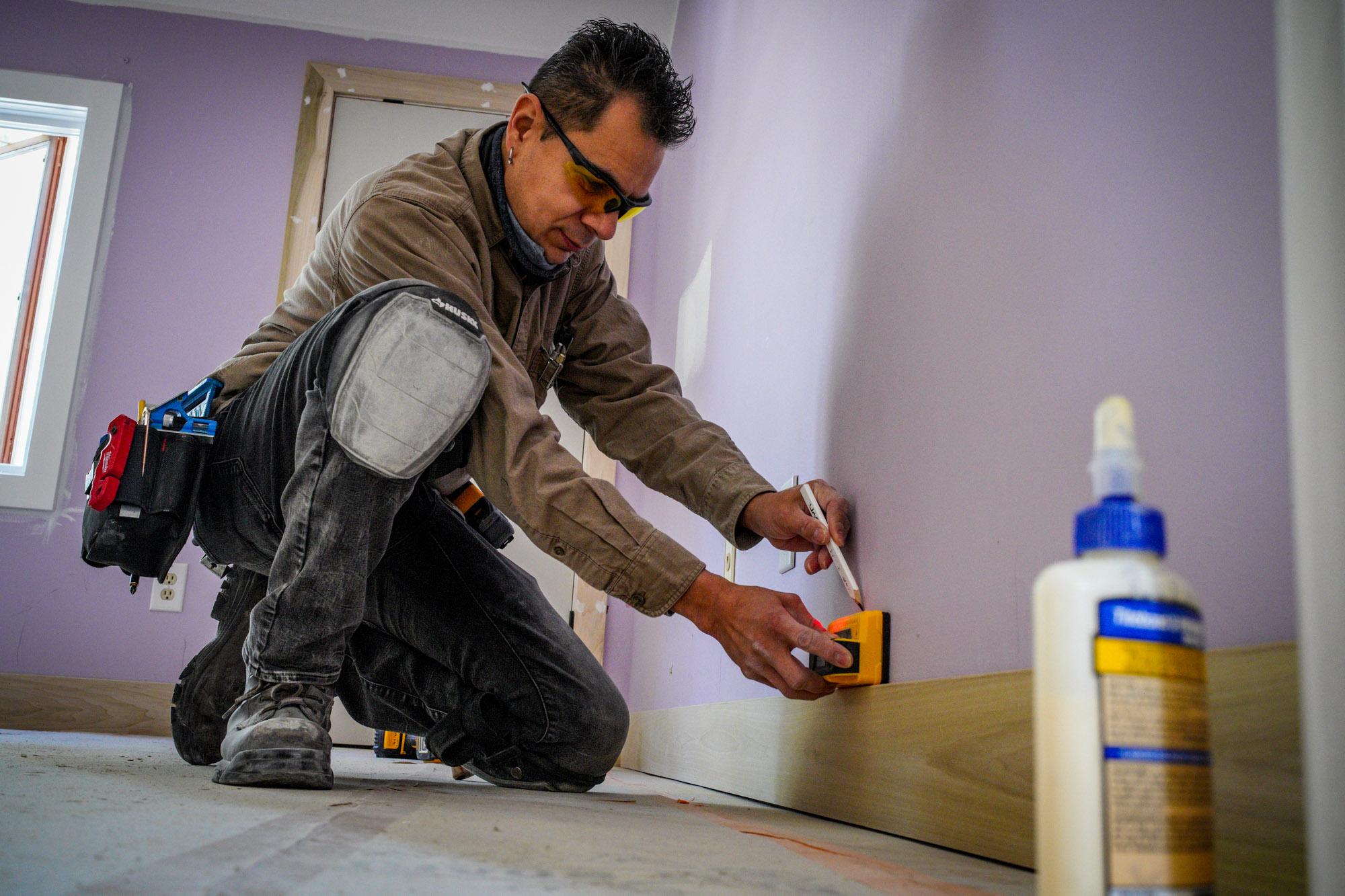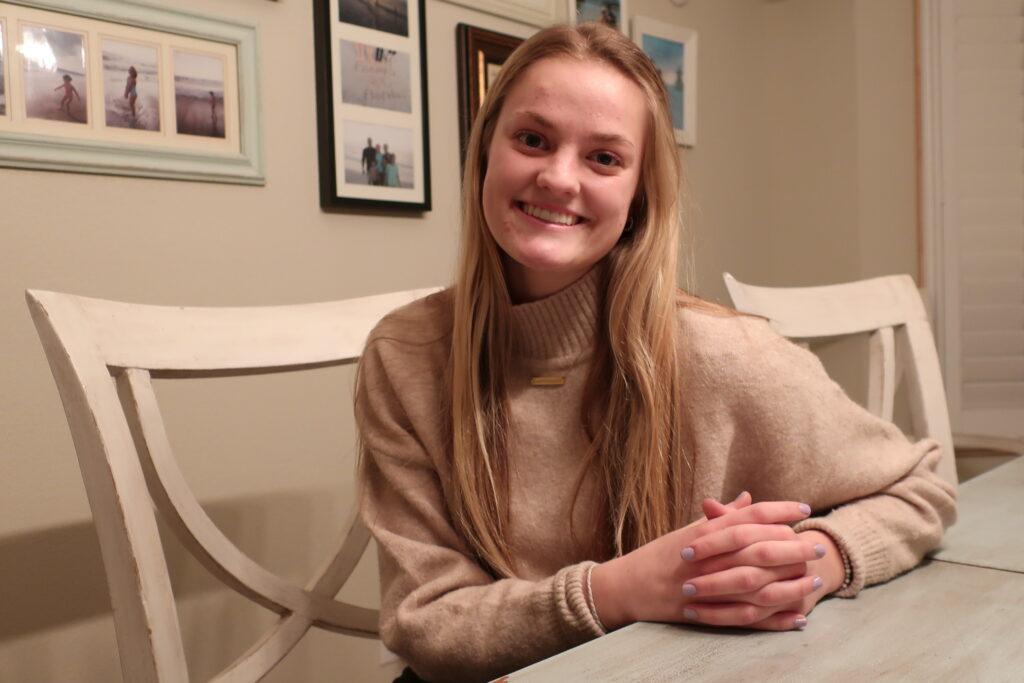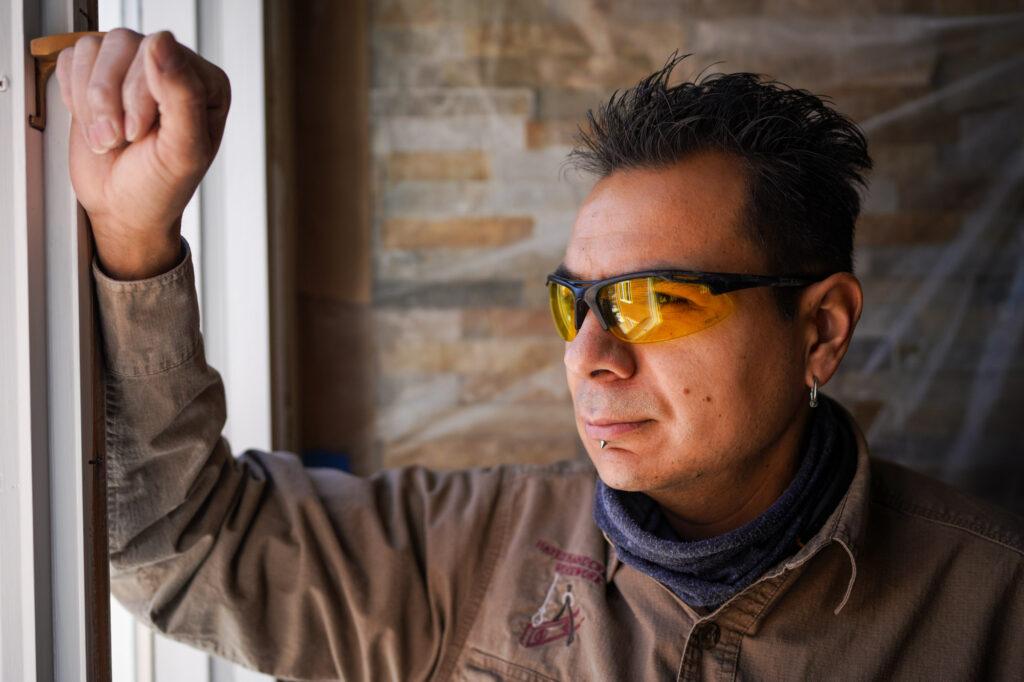
The pandemic dropped like a bomb on construction worker and carpenter Ussiel Rubio.
“We went from working 60 hours a week to working 18 to 20 hours a week,” he said.
Then the father of three got COVID-19 for a month, which later left him with sharp pains shooting down his leg. He couldn’t work for a long time, and the emergency room visits and medical bills piled up. Rubio said he just tried to survive, “like millions of other people around the world.”
When he recovered, Rubio was browsing Arapahoe Community College’s website, when by chance he saw a link for a program called Career Forward.
“It was an opportunity right there in front of my eyes,” he said.
It provides scholarships and other support to people who lost their jobs because of COVID-19. Alongside his full-time job at Hayes Handcrafted Woodwork, Rubio is taking classes like construction management estimating and management and soon -- kitchen and bathroom design. All will yield certificates that can go toward an associate’s degree.
Rubio said without the scholarship, he wouldn’t have been able to take the classes.
“The more skills you can get the more companies that you can help, the more opportunities you can get,” he said.
The rising costs of four-year colleges, rising cost of living, and changing expectations among students are all fueling a plethora of new programs, especially in Colorado’s community colleges and 4-years like MSU Denver: New certificates in energy technology and cybersecurity. Apprenticeships in medical fields and finance. Programs that make it easier to take a certificate and get on a smooth path to a degree.
There are an estimated 13,000 students in Colorado who have “stopped out” — meaning they have some college credits, but stopped short of getting a degree. Now some education and industry leaders want to get them credentialed.
There has been a cultural shift toward more skill-based hiring, rather than simply seeing the value in a degree.
In addition, over the past few years, the Colorado Talent Pipeline Report, which identifies top jobs and industries in the state “has become sort of entrenched in our culture,” said Kim Poast, chief student success and academic affairs officer at the Colorado Department of Higher Education.
“I think what you've seen for higher ed is a shift towards meeting those top jobs in a more intentional way. So certainly, information technology, advanced manufacturing, health care, education.”
Getting more education to get higher wage jobs or stacking certificate programs into a degree — students are much less likely to end up in debt and arrive at a livable wage, said Eric Dunker, associate vice president and dean of business technology and workforce partnerships at Arapahoe Community College.
“If we embed industry certifications within our technology pathways you can graduate here, go work for Lockheed Martin and start at $75,000,” said Dunker.
For several years, Arapahoe Community College has tried to align their degrees to industry needs. During the pandemic, it worked closely with regional workforce centers to reach out to unemployed workers, many in the service industry.
“If we do a better job in being transparent about a health pathway — there's entry level at $15 to $18 an hour, but within a year or two, if you upskill into certain certifications, you can get to $25, $30 an hour quickly,” Dunker said.
The college also attracts people who’ve been in the field for 20 years. Take marketing for example. The world has changed a lot in 20 years and employers want older workers to have the latest skills. ACC will soon launch a digital marketing certificate. Colleges are now trying to make seamless education pathways — where credits are given for on-the-job experience or for prior learning — that let someone get a degree more quickly.
“I do believe more students, if you put that pathway out there are looking for that. And we saw that during the pandemic,” said Dunker. He said schools and industry need to do a better job of ushering people into the right programs.

Ivy Franks has always known she wants to be a nurse.
But there are associate’s degrees and bachelors of nursing programs, “so many different options, but not as much guidance,” the 18-year-old said.
Like many students, Franks wants maximum flexibility right now. She found out her 16 credits from a nursing program in Phoenix, which didn’t work out, won’t transfer anywhere. So, Franks was looking for a way to get her prerequisites done, again, affordably — and keep working full-time. She heard about a new program at the online CSU Global.
No transcripts, no enrolling in a college program, monthly start times, no placement examples — that is the gist of the new Global Direct program that just launched. The goal is to prepare students for professional schools elsewhere.
“You're instantly accepted. You don't need to prove that you're smart enough for them or because it's scary trying to apply for colleges,” Franks said. “They have these GPA requirements. They have SAT requirements. I couldn’t even take the SAT because of COVID — and so with CSU Global, they take you as you are.”
Administrator Paul Savory uses the example of his brother, who in his 50s, decided to become a nurse. Though his brother had a degree in biology, he didn’t have all the prerequisites he needed for nursing school. He had to go to three different schools to get them all. Like other schools during the pandemic, CSU Global was busy figuring out how to give more students what they need.
“Traditionally, our paradigm is, ‘hey, we recruit a student for a degree.’ I said, let's take that off the plate. Now, what would we recruit students for? Courses. Well, what types of courses? And that's where I brought in the example of my brother.”
The idea was to create a one-stop shop that offers a flexible way to get the courses you need, whether you want to go into nursing, pharmacy school, become a doctor or a physician's assistant.
Students attend a class before the course starts to get a deep sense of the material and expectations and they decide whether they can meet them. CSU Global Direct is starting with health care classes but hopes to next develop prerequisite business courses.
Though most of CSU Global’s students are older, for ever-practical 18-year-old Franks, the flexibility of online is perfect. Will she miss the social opportunities dorm life brings?
“I can still get it. I don't need to pay $8,000 a semester for that,” she laughed.
Frank's statement may hint at the changes in what some young people are looking for after high school. Here’s how Savory puts it:
“Students are becoming better at self-directing themselves on what they want and what they need.”
Other colleges, too, recognize that many people want to simply upgrade certain skills to make themselves more marketable, or to get a pay raise or to simply explore a new field without committing to an entire course of study.
Get the skills you need for free while only giving your name and email address
MSU Denver’s Skills Lab launched in fall 2020. The program is free to anyone and provides micro-credentials to help people brush up or learn new skills. It offers short online courses in four growing industries: data science; e-commerce; health and human services; and information technology and cybersecurity.
More than 1,200 people have taken courses, which are about 10-hours in a faculty-led lab where participants earn a digital badge that can go on a resume.
The Skills Lab courses don’t come with credits so can’t be applied to a degree. However, the school’s new Career Launchpad offers pathways to high-demand careers that may start with a course without credits.
Several community colleges are spearheading five “micro-pathways” in energy and health care — two fast-growing and critical industries in Colorado. They are being developed in partnership with the Education Design Lab, a national nonprofit that designs, implements and scales new learning models for higher education.
Industry leaders and employers will be asked to identify exact skills and competencies needed. College will map out a clear learning track into jobs that are high-skill, high-wage, and can be completed in less than a year. It will combine classes that bear credits and those courses that don’t, as well as industry-recognized credentials.
The community college system hopes to launch the five pilot programs over the next few years at seven community colleges across Colorado.

Apprenticeships are all the rage in every possible sector: finance, IT, health care, education, advanced manufacturing, STEM
The earn-while-you-learn model is also growing in popularity. Employers get workers, while the apprentices gain skills while they are paid. Secretary of Labor Marty Walsh was in Denver recently to announce a $113 million investment to grow diversity in apprenticeships.
The state is gearing up to increase access and invest in apprenticeships on a much larger scale. The state has FAQs on apprenticeships, lists all the businesses that have federally approved apprenticeships. There is also a Collegiate Apprenticeship Program, most community colleges in the state have robust apprenticeship programs, and high school students can become apprentices.
CU Denver, a four-year school, just announced its first-ever apprenticeship programs — in the areas of construction project management and user experience designer — two fast-growing industries in the region.
After studying until midnight, Ussiel Rubio is up at 6 a.m. to travel to his job site in Boulder. His employer is flexible, letting him leave early if he has a class.
Rubio had been doing carpentry for about 10 years — construction remodels, building cabinets and countertops. He loves his work. But a few years ago, he realized building his skills bit by bit was the key to a better future.
“Something changed in my mind. I had a click, why not go back to school? I’m almost 40, but it’s never too late, and the time will pass anyways if you take action or not and I decided to take action,” he said.
When he graduates from his carpentry courses, his goal is to help his employer, Hayes Handcrafted Woodwork.
“I see great potential for growth with them so I would love to help them expand grow by bringing to them my skills, knowledge and abilities that I have learned in school combined with my work experience and abilities in construction and carpentry … I can help them to be more successful at what they do and also I want to be successful with them.”









